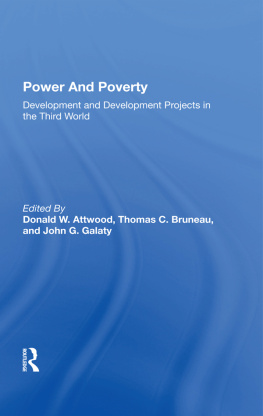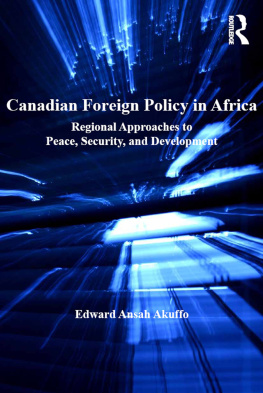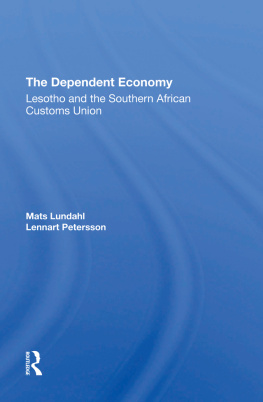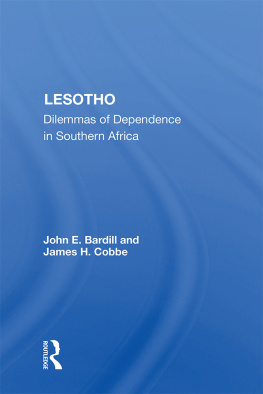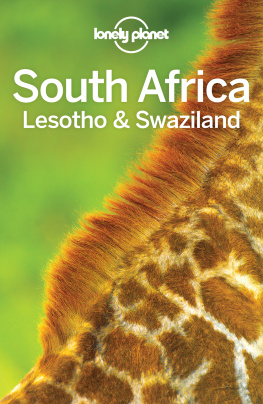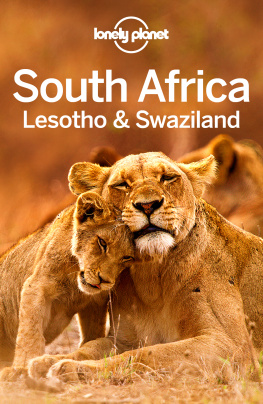
DREAMS FOR LESOTHO
RECENT TITLES FROM THE HELEN KELLOGG INSTITUTE SERIES ON DEMOCRACY AND DEVELOPMENT
Paolo G. Carozza and Anbal Prez-Lian, series editors
The University of Notre Dame Press gratefully thanks the Helen Kellogg Institute for International Studies for its support in the publication of titles in this series.
Barry S. Levitt
Power in the Balance: Presidents, Parties, and Legislatures in Peru and Beyond (2012)
Srgio Buarque de Holanda
Roots of Brazil (2012)
Jos Murilo de Carvalho
The Formation of Souls: Imagery of the Republic in Brazil (2012)
Douglas Chalmers and Scott Mainwaring, eds.
Problems Confronting Contemporary Democracies: Essays in Honor of Alfred Stepan (2012)
Peter K. Spink, Peter M. Ward, and Robert H. Wilson, eds.
Metropolitan Governance in the Federalist Americas: Strategies for Equitable and Integrated Development (2012)
Natasha Borges Sugiyama
Diffusion of Good Government: Social Sector Reforms in Brazil (2012)
Ignacio Walker
Democracy in Latin America: Between Hope and Despair (2013)
Laura Gmez-Mera
Power and Regionalism in Latin America: The Politics of MERCOSUR (2013)
Rosario Queirolo
The Success of the Left in Latin America: Untainted Parties, Market Reforms, and Voting Behavior (2013)
Erik Ching
Authoritarian el Salvador: Politics and the Origins of the Military Regimes, 18801940 (2013)
Brian Wampler
Activating Democracy in Brazil: Popular Participation, Social Justice, and Interlocking Institutions (2015)
J. Ricardo Tranjan
Participatory Democracy in Brazil: Socioeconomic and Political Origins (2016)
Tracy Beck Fenwick
Avoiding Governors: Federalism, Democracy, and Poverty Alleviation in Brazil and Argentina (2016)
Alexander Wilde
Religious Responses to Violence: Human Rights in Latin America Past and Present (2016)
Pedro Meira Monteiro
The Other Roots: Wandering Origins in Roots of Brazil
and the Impasses of Modernity in Ibero-America
For a complete list of titles from the Kellogg Institute Series on Democracy and Development, see http://www.undpress.nd.edu
DREAMS
FOR
LESOTHO
Independence,
Foreign Assistance,
and Development
JOHN AERNI-FLESSNER
University of Notre Dame Press
Notre Dame, Indiana
University of Notre Dame Press
Notre Dame, Indiana 46556
undpress.nd.edu
Copyright 2018 by University of Notre Dame
All Rights Reserved
Published in the United States of America
Library of Congress Cataloging-in-Publication Data
Names: Aerni-Flessner, John, author.
Title: Dreams for Lesotho : independence, foreign assistance, and development / John Aerni-Flessner.
Description: Notre Dame, Indiana : University of Notre Dame Press, 2018. |
Series: Helen Kellogg Institute series on democracy and development |
Identifiers: LCCN 2017055857 (print) | LCCN 2017056758 (ebook) | ISBN 9780268103637 (pdf) | ISBN 9780268103644 (epub) | ISBN 9780268103613 (hardcover : alk. paper) | ISBN 0268103615 (hardcover : alk. paper)
Subjects: LCSH: Economic developmentLesotho. | Economic development LesothoInternational cooperation. | LesothoEconomic conditions1966- | LesothoPolitics and government1966-
Classification: LCC HC920 (ebook) | LCC HC920.A56 2018 (print) | DDC 338.96885dc23
LC record available at https://lccn.loc.gov/2017055857
This paper meets the requirements of ANSI/NISO Z39.48-1992 (Permanence of Paper).
This e-Book was converted from the original source file by a third-party vendor. Readers who notice any formatting, textual, or readability issues are encouraged to contact the publisher at
CONTENTS
FIGURES AND TABLE
FIGURES
TABLE
ACKNOWLEDGMENTS
An author can write a book only by accruing debts, and this book has accrued a large number. So I start with the caveat that while many eyes have looked over this work, any errors of fact and interpretation that remain are mine alone.
The institutions and individuals that have supported this book are located on three continents. In Lesotho, where I accrued my largest debts, the National University of Lesotho (NUL) provided a fruitful home for research in 20089 through affiliation with the Institute of Southern African Studies. A stimulating Friday seminar series there allowed me to better understand and grapple with regional politics, history, and economics. I am grateful to the series organizers for allowing me to present the first bit of this research in April 2009. Ntate K. C. Maimane and the rest of the faculty in African Languages and Literature were kind enough to tutor me in Sesotho. Bo-Ntate Motlatsi Thabane, Tefetso Mothibe, and Munyaradzi Mushonga of the Department of Historical Studies and Jesmael Mataga (now at Sol Plaatje University) were welcoming and supportive as I struggled to gain a fuller understanding of Lesothos history. Me Tebello at the Lesotho National Archives, Me Mathabo at the NUL Institute of Education, Ntate Sekhonyela Molapo at the NUL Library archives, and the staff of the Morija Museum and Archives provided assistance. The staff at Moeletsi oa Basotho supported my quest to find, contextualize, and scan images from their photographic collection, and I am grateful for their permission to include some of the images in this book. Ntate Stephen Gill of Morija helped to identify interview sources and served as a sounding board for my ideas. Kennedy Matsepe, Leseli Leseli, Motlatsi Thabane, Matt Morley, Kimberley Pal Keeton, and Chris Conz also pointed me to people whom I interviewed for this project. Scott Rosenberg and Richard Weisfelder were helpful in discussing the logistics of research in the Mountain Kingdom.
In Lesotho, I also owe many debts of gratitude to those who took me into their homes and made me feel part of their families since I first arrived to teach high school in 2002. The Sisters of the Good Shepherd welcomed me to St. Rodrigue High School, where my teaching experience was formative, and allowed me to live at their hostel in Roma. Ntate Leseli Leseli and Me Maboleba Kolobe have been good friends, and I look forward to many more good memories and visits with their respective families. The Selebalo family from Ha Mamathes lovingly welcomes me with open arms every time I return. Donald Mcmillan and Loretta Houston-Mcmillan were kind enough to allow me to stay with them in Maseru. Finally, I owe a special debt to Sister Armelina Tsiki, who has been a friend, mentor, and interview subject. I strive to emulate her grace and compassion and desire to work for the common good.
My undergraduate institution, Grinnell College, gave me great grounding in the practice of history, and sent me to Lesotho for the first time, and for that I remain grateful. My adviser, and now confidant and friend, George Drake, urged me to apply for the Lesotho teaching program, and I am thankful that I had the wisdom to listen to him. At Washington University in St. Louis, the Department of History and the International and Area Studies Program provided generous support to start the research for this book. My graduate adviser, Timothy Parsons, has been the best mentor an aspiring academic can hope for. He always made time to read my written material and has provided sage counsel through the years. Jean Allman, Lori Watt, Shanti Parikh, Nathan Jensen, and Mary Ann Dzuback served on my committee and have continued to play a mentoring role in my academic life. During graduate school, Iver Bernstein, Elizabeth Borgwardt, Daniel Bornstein, Margaret Garb, Derek Hirst, Christine Johnson, Peter Kastor, Steven Miles, Sloan Mahone, J. Cameron Monroe, Sowande Mustakeem, Mungai Mutonya, Guy Ortolano, Wilmetta Toliver-Diallo, Sasha Turner, and Robert Vinson were all encouraging. My peers in the graduate program at Washington University were also sources of strength: Kevin Butterfield, Ben Dyer, Rajbir Hazelwood, Sara Jay, Matthew Stewart, Scott Morris, Tanya Roth, Muey Saeteurn, Steve Schrum, and Janek Wasserman. I might not have made it through graduate school without my running buddies: Ryan Chapman, Zac Freudenburg, Jason Holroyd, Dusty Lopez, and Tyler Small. A Fulbright-Hays Doctoral Dissertation Research Abroad Fellowship made my initial research possible. Sheryl Peltz worked wonders to help me navigate the university bureaucracy. Robert Edgar, now retired from Howard University, has been a great champion of this project.


